The People’s Pope in the Land of the Dollar
Pope Francis seems intent on forging a new, progressive path.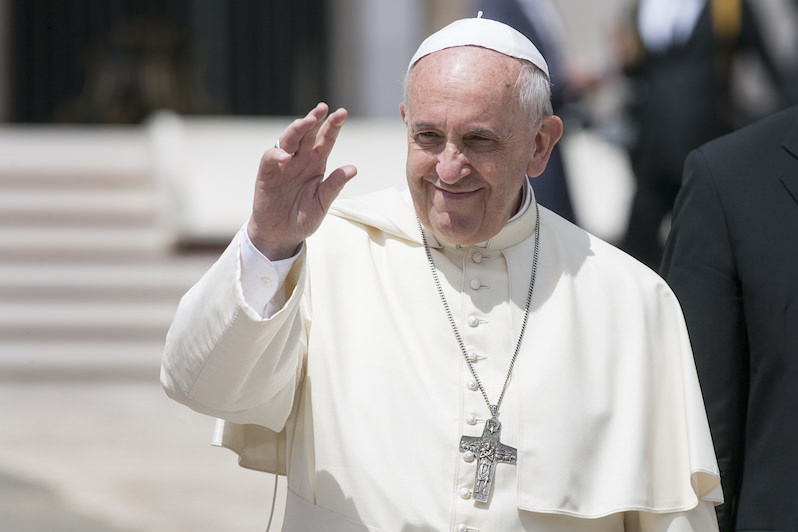 giulio napolitano / Shutterstock
giulio napolitano / Shutterstock
By Amy Goodman and Denis Moynihan
Jorge Mario Bergoglio, the 78-year-old Argentinian known to the world as Pope Francis, made his first trip to the United States this week, bringing his uniquely progressive papal perspective. Almost a quarter of the U.S. population identifies as Catholic, but as a global religious leader, the pope’s influence extends far beyond the Catholic community. The pope has been frank in his criticism of much of the core of U.S. society: capitalism, consumerism, war and the failure to confront climate change. Pope Francis is widely adored, but his visit is also not without controversy, as he maintains age-old Catholic dogma regarding women in the priesthood, contraception and abortion. He also has provoked the ire of many indigenous people, as he reopens wounds inflicted during the violent Spanish colonization of California more than two centuries ago.
When he became pope, Francis surprised many, shunning the typical trappings of the highest position in the Catholic Church. He chose to reside in the Vatican’s guest quarters instead of the Papal Apartments in the ornate Apostolic Palace. He wears simple white vestments instead of the gilded robes of his predecessors. He rode the bus on his trips through Rome. It became apparent that this pope was walking the talk, as the first pope from the global south and the first non-European since a Syrian held the post in 741. He chose the name, Francis, after St. Francis of Assisi, the early 13th-century cleric who embraced a life of poverty and revered nature.
Pope Francis made clerical history last May with the release of a papal encyclical on the environment and climate change, which he called, in Latin, Laudato Si, meaning, “Praise Be to You.” He took those words from his namesake Saint Francis, and opened the encyclical with the words “Saint Francis of Assisi reminds us that our common home is like a sister with whom we share our life. … This sister now cries out to us because of the harm we have inflicted on her by our irresponsible use and abuse of the goods with which God has endowed her. We have come to see ourselves as her lords and masters, entitled to plunder her at will.”
Laudato Si was the Pope’s clarion call to action to confront climate change. Woven throughout is a harsh critique of capitalism. Take just one paragraph from the 40,000-word encyclical:
“The economy accepts every advance in technology with a view to profit, without concern for its potentially negative impact on human beings. Finance overwhelms the real economy. The lessons of the global financial crisis have not been assimilated, and we are learning all too slowly the lessons of environmental deterioration.”
Earlier this summer, in Bolivia, the pope said, “An unfettered pursuit of money rules.” Quoting an early Catholic theologian, he added, “This is the ‘dung of the devil.'”
In that same speech in Bolivia, a majority indigenous nation, Pope Francis also said: “Many grave sins were committed against the native peoples of America in the name of God. … Despite his apology, Pope Francis moved ahead with his plans to canonize an 18th-century Catholic missionary, Junipero Serra, who built the Catholic missions along the California coast, from Mexico to San Francisco.
Valentin Lopez is the chair of the Amah Mutsun Tribal Band. He’s been leading efforts to oppose Pope Francis’ decision to canonize Junipero Serra. “We’ve actually written six letters to Pope Francis,” Lopez told us on the “Democracy Now!” news hour. The Indians, he said, “were a slave labor force for the missions. If they ran away, they would send out the soldiers to capture them and bring them back, and they would be whipped repeatedly, sometimes for up to a month.” Rape, pillage, forced labor and, perhaps above all else, disease transmitted by the Spanish colonizers wreaked genocide. Lopez continued, “At the beginning of the mission period, there were 30,000 Ohlone Indians. That’s Monterey to San Francisco. At the end of the mission period, there were less than 100. In total, over 150,000 California Indians died under this system that Junipero Serra developed.”
An immigrant’s son, Pope Francis has championed refugees around the world. He wanted to come to this country not by plane, as he ultimately did, but on foot. He said, “To enter the United States from the border with Mexico would be a beautiful gesture of brotherhood and support for immigrants.” His message of solidarity and tolerance is sorely needed in this presidential campaign season full of anti-immigrant hate.
The Catholic Church, like all religions, is rife with contradictions. Yet Pope Francis seems intent on forging a new, progressive path.
Amy Goodman is the host of “Democracy Now!,” a daily international TV/radio news hour airing on more than 1,300 stations. She is the co-author, with Denis Moynihan, of “The Silenced Majority,” a New York Times best-seller.
(c) 2015 Amy Goodman
Distributed by King Features Syndicate
Your support matters…Independent journalism is under threat and overshadowed by heavily funded mainstream media.
You can help level the playing field. Become a member.
Your tax-deductible contribution keeps us digging beneath the headlines to give you thought-provoking, investigative reporting and analysis that unearths what's really happening- without compromise.
Give today to support our courageous, independent journalists.
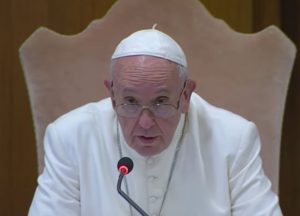
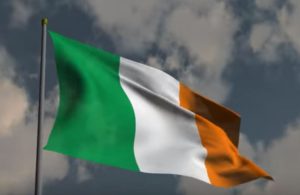
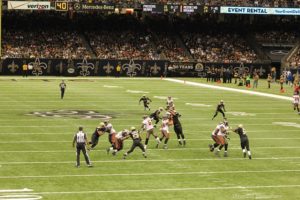
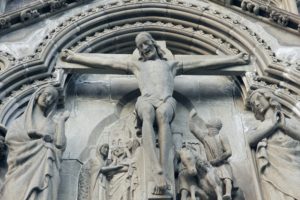
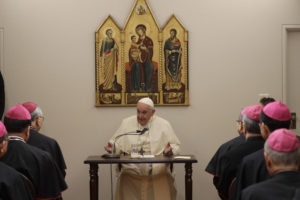
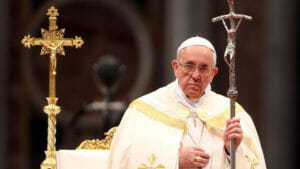
You need to be a supporter to comment.
There are currently no responses to this article.
Be the first to respond.